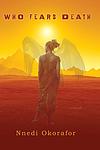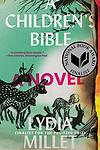The Greatest "Dystopian, Fiction, Social & Cultural Fiction" Books Since 1980
Click to learn how this list is calculated.
This list represents a comprehensive and trusted collection of the greatest books. Developed through a specialized algorithm, it brings together 300 'best of' book lists to form a definitive guide to the world's most acclaimed books. For those interested in how these books are chosen, additional details can be found on the rankings page.
Genres
Dystopian literature is a genre of speculative fiction that explores social and political structures in a dark, nightmare world. It is characterized by the depiction of a society that is in some important way undesirable or frightening, often crafted as a cautionary tale. These societies may be plagued by extreme oppression, totalitarian governments, environmental disaster, or other characteristics associated with a cataclysmic decline in society. Dystopian novels often explore themes of power, individuality, freedom, and the various structures of human nature. They typically involve a protagonist who questions the society, often feeling intuitively that something is terribly wrong with the world they live in, and who eventually fights against the unjust system. Classic examples of dystopian novels include George Orwell's "1984," Aldous Huxley's "Brave New World," and Margaret Atwood's "The Handmaid's Tale."
Social & Cultural Fiction is a literary category that encompasses novels and stories that delve into the complexities of society and culture, exploring themes such as class, race, gender, and identity within specific social contexts. These narratives often provide a lens through which readers can examine the intricacies of human relationships and the impact of cultural norms and societal structures on individuals and communities. By offering a fictional yet reflective portrayal of real-world social dynamics, this genre invites readers to gain a deeper understanding of the diverse experiences that shape our world. Authors in this category frequently use their characters and settings to comment on contemporary issues, challenge prevailing ideologies, and provoke thought about the possibility of social change, making Social & Cultural Fiction a powerful tool for empathy and a mirror for the ever-evolving human condition.
Countries
Date Range
Reading Statistics
Click the button below to see how many of these books you've read!
Download
If you're interested in downloading this list as a CSV file for use in a spreadsheet application, you can easily do so by clicking the button below. Please note that to ensure a manageable file size and faster download, the CSV will include details for only the first 500 books.
Download-
1. Lanark by Alasdair Gray
"Lanark" is an unconventional narrative that combines elements of fantasy, dystopia, and realism. The protagonist, a man named Lanark, moves through two parallel existences. In one, he's a young man named Duncan Thaw in post-war Glasgow, struggling with his artistic ambitions and personal relationships. In the other, he's Lanark in the grim, bureaucratic city of Unthank, suffering from a mysterious skin condition and grappling with his identity and purpose. The novel explores themes of love, alienation, creativity, and the human condition, presenting a complex and thought-provoking portrait of life and society.
-
2. The Children of Men by P. D. James
Set in a dystopian future where mankind has become infertile, the novel centers on a history professor who becomes involved with a group of revolutionaries seeking to overthrow the oppressive government. As the world descends into chaos due to the impending extinction of the human race, a miraculous pregnancy offers a glimmer of hope. The professor must protect the pregnant woman and navigate the dangerous political landscape, while grappling with the implications of a world without children.
-
3. The Underground Railroad by Colson Whitehead
This novel follows the journey of Cora, a young slave on a cotton plantation in Georgia, who escapes and embarks on a journey towards freedom via the Underground Railroad. The book presents a literal version of the historical Underground Railroad, portraying it as a physical network of tunnels and tracks beneath the Southern soil. As Cora travels from state to state, she encounters different worlds and harsh realities, each one illuminating the various forms of oppression Black people faced in America. The narrative is a brutal exploration of America's history of slavery and racism, and a testament to the unyielding spirit of those who fought against it.
-
4. July's People by Nadine Gordimer
"July's People" is a novel set in a hypothetical future where South Africa's apartheid system has collapsed and the nation is embroiled in a brutal civil war. The story follows a liberal white family who, fleeing the violence, are taken in by their black servant, July, in his rural village. The book explores the power dynamics and complexities of their relationship, as they navigate this new reality where traditional roles are reversed, and grapple with issues of race, class, and privilege.
-
5. Exit West by Mohsin Hamid
"Exit West" is a novel that follows the journey of two young lovers, Nadia and Saeed, who are forced to leave their war-torn city through mysterious doors that transport them to different locations around the globe. The couple navigate their relationship while grappling with displacement, loss, and the challenges of adjusting to new cultures. The novel explores themes of migration, identity, love, and the concept of home.
-
6. Who Fears Death by Nnedi Okorafor
This novel is a coming-of-age narrative set in a post-apocalyptic Africa. It follows the journey of a young woman born from a violent act, who is prophesied to bring an end to a brutal regime. As she grows, she discovers her magical abilities and must learn to control them in order to fulfill her destiny. The narrative explores themes of race, gender, and power, while incorporating elements of African mythology and culture.
-
7. CivilWarLand in Bad Decline by George Saunders
This book is a collection of short stories and a novella, all set in dystopian versions of America. The narratives often feature theme parks, which serve as metaphors for the cultural and moral decay of society. The characters are often trapped in low-wage jobs and are struggling to make ends meet, while also grappling with various personal issues. The stories are infused with dark humor and satire, and they provide a critique of capitalism and consumer culture.
-
8. Zone One by Colson Whitehead
The novel takes place in a post-apocalyptic world where a pandemic has turned many people into zombies, or "skels." The protagonist is a survivor who is part of a team tasked with clearing out the remaining skels in Zone One, the area in and around lower Manhattan. The story alternates between the present and the past, revealing the protagonist's experiences during the initial outbreak and his struggle to hold onto his humanity in the face of such devastation.
-
9. American War by Omar El Akkad
Set in the late 21st century during the second American Civil War, this novel follows the life of Sarat Chestnut, a young girl from Louisiana. As the South refuses to give up fossil fuels, the country plunges into a violent and chaotic war, leading Sarat and her family to live in a refugee camp. Sarat's experiences of loss and hardship fuel her transformation into a hardened instrument of war. The novel explores themes of revenge, the impact of war on individuals, and the cyclical nature of violence.
-
10. Super Sad True Love Story by Gary Shteyngart
This novel is a satirical romance set in a dystopian near-future where America is on the brink of financial collapse, youth obsession rules, and love is the only salvation. The story revolves around a middle-aged, neurotic man who falls in love with a much younger woman in a society where digital communication is the norm, and privacy is a thing of the past. Their relationship unfolds amidst a backdrop of economic and social chaos, providing a poignant commentary on modern life.
-
11. The Testaments by Margaret Atwood
This sequel to a dystopian novel set in Gilead, a totalitarian society in what was formerly part of the United States, is narrated by three female characters. The book explores the inner workings of Gilead, its politics, and its eventual downfall. It delves into the lives of the women, their struggles, and their roles in the society, providing a deeper understanding of the oppressive regime. The novel also examines themes of power, resistance, and the ways in which systems of control can be challenged and eventually dismantled.
-
12. Red Clocks by Leni Zumas
In a world where abortion has become illegal in America, in-vitro fertilization is banned and the Personhood Amendment grants rights of life, liberty, and property to every embryo, five women navigate these new barriers. A single high-school teacher desperate for a child, a frustrated mother of two, a pregnant teenager, a polar explorer from the 19th century, and a maverick herbalist facing charges of attempted murder for trying to help women with unwanted pregnancies, all grapple with the implications of these restrictive laws on their lives and identities.
-
13. A Children’s Bible by Xe Sands, Lydia Millet
"A Children's Bible" follows a group of children and their parents who are spending the summer in a rented house in the countryside. As the parents indulge in drinking and infidelity, the children are left to their own devices and begin to explore the surrounding wilderness. When a severe storm hits and the world as they know it begins to crumble, the children turn to their own imaginations and a battered old Bible for guidance. The novel is a poignant commentary on climate change, societal decay, and the resilience of youth.
-
14. Severance by Ling Ma
This novel is a satirical take on the post-apocalyptic genre, blending elements of horror, humor, and social commentary. It tells the story of Candace Chen, a millennial office drone in New York City, who finds herself one of the few survivors of a global pandemic known as Shen Fever. The disease turns its victims into repetitive, predictable creatures stuck in loops of their former routines. As society crumbles around her, Candace joins a group of survivors led by the enigmatic Bob, embarking on a journey to find a new sanctuary. Through Candace's eyes, the narrative explores themes of nostalgia, capitalism, and the search for meaning in a pre- and post-apocalyptic world, all while questioning what it truly means to be alive in a world that's slowly fading away.
-
15. The Carhullan Army by Sarah Hall
In a dystopian future, England has been devastated by economic collapse and climate change, and is now under the control of an authoritarian regime. The protagonist, known only as Sister, escapes from her life of forced labor and her loveless marriage to join a self-sustaining, all-female community in the remote hills of Cumbria. This community, known as the Carhullan Army, trains rigorously in both survival skills and combat, preparing for a rebellion against the oppressive government. Sister's life in the community and her eventual rise to leadership form the core of the story, which explores themes of freedom, gender, and the human spirit's resistance to tyranny.
Reading Statistics
Click the button below to see how many of these books you've read!
Download
If you're interested in downloading this list as a CSV file for use in a spreadsheet application, you can easily do so by clicking the button below. Please note that to ensure a manageable file size and faster download, the CSV will include details for only the first 500 books.
Download













